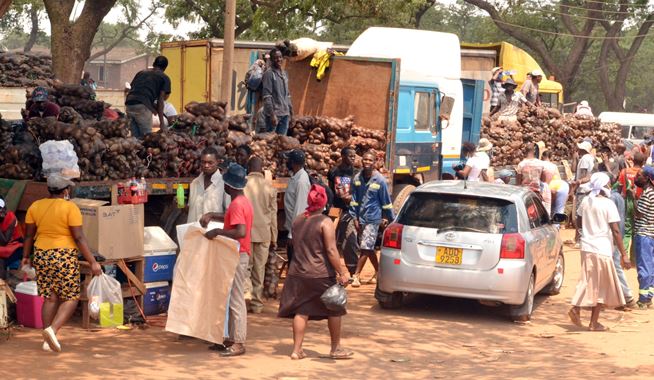|
Getting your Trinity Audio player ready...
|
By Charles Dhewa
When you want to understand African food systems, visit African mass food markets in big cities. This is where most food commodities are mobilized from diverse parts of each country. While every community may have its own local market, commodities in that market are not as diverse as those found in mass food markets in big African cities like Addis Ababa, Nairobi, Kampala, Cairo, Kinshasa, Lagos, Accra, Bamako, Dakar, Harare, Maputo, Johannesburg and many others.
Knowledge in action
Using data and evidence to build resilient food systems
The first step is data collection from production, along the supply chain (logistics – what is being transported from where to where?) and collecting data from the demand side or markets in terms of volumes demanded by different markets as well as quantities that can be absorbed by each market without causing gluts that cause losses for farmers or shortages that push prices beyond the majority of consumers. Markets also want to know how much is being produced out there? How much is being supplied in different markets? Unfortunately, for both formal and informal, most African governments lack systems or pathways for accurately and consistently informing all actors in the food system. When markets have no idea what is being produced and where, it becomes difficult for them to operate efficiently.
In order to creatively match supply and demand in food systems, each African country’s ministry of agriculture should be converted into a giant switch board whose main role becomes consolidating statistics on what is happening in diverse production zones in real time including volumes of commodities flowing to different markets, inputs requirements as well as how resources are being used. The core business of the minister of agriculture or permanent secretary should not be visiting every field day but making sense of what is coming from thousands of field days happening across the country every day. If ministers and permanent secretaries are to visit every farmer who is doing well, they will spend more than five years before completing that exercise because there is no shortage of successful farmers worth visiting.
The extent to which mass food markets are changing the livelihoods of rural communities can be revealed through data on incomes circulating in these markets. For instance, what is the contribution of baobab to rural livelihoods? How much are mass markets contributing to building resilience in urban populations? These markets are the ones sourcing and distributing food in the urban populations and also ensuring diverse nutrition is affordable to the majority of rural and urban consumers.
Collecting data to inform the daily operations of the ministry of agriculture should not be taken as a donor-driven project but integrated into the government fiscus so that it becomes part of the new normal. When the ministry of agriculture starts functioning as a giant switchboard for the entire food system, all actors in the food system become accountable. The current situation where contractors are left doing their own things, NGOs doing their own thing, parastatals doing their own thing, farmer unions doing their own thing, and individual farmers doing their own thing, makes it very difficult to organize agriculture and food systems. Yet all these diverse actors are saving the same consumer and same market.
Most development agencies are often competing to support the production of the same commodities without any relation to what the government and contractors are doing. More importantly, their interventions lack data or evidence to justify why they should, for instance, promote the production of exotic chickens or goats in communities where indigenous chickens, goats, and guinea fowls do very well naturally. These organizations would make a difference by cultivating the external market for indigenous food rather than contributing to more gluts.
Understanding who is producing what, where, and for who requires the ministry of agriculture to set up an integrated system for gathering, interpreting, and sharing information within the agriculture and food systems sector. A culture of data collection and sharing needs to be cultivated from policy to grassroots levels. Farmers and rural communities have a lot of information but do not know who to share it with. If you ask them, they know when all their cattle were born, their hectares and several other intricate details which may only need to be gathered and processed into reliable fluid records with the support of extension officers. This should be an important new role for African extension officers not teaching farmers how to grow maize or prepare the land as if farmers are not able to do that for themselves or seek relevant knowledge from their peers.
Making sense of climate change through mass food markets
The impact of climate change can also be seen through African mass markets. When production zones that used to supply particular commodities like yams and indigenous rice stop being a source of such commodities, it is a sign that production has dwindled due to climate variability. Policymakers can use such intelligence to save commodities that may be threatened by extinction. With globalization becoming more aggressive, traditional practices are not remaining the same. A lot of changes are happening noticed and unnoticed across Africa. Some of the changes are associated with the increasing loss of biodiversity and degradation of ecosystems which are the foundation of indigenous knowledge in many African communities. Biodiversity loss and ecosystem degradation also mean loss of indigenous knowledge systems. Mass food markets are part of the solution by blending food and knowledge from diverse sources or communities, creating totally different knowledge systems. Given high levels of ecosystem degradation and biodiversity loss in many communities and production zones, most communities will depend on mass markets for their food.
Website: www.emkambo.co.zw / www.knowledgetransafrica.com
Mobile: 0772 137 717/ 0774 430 309/ 0712 737 430






